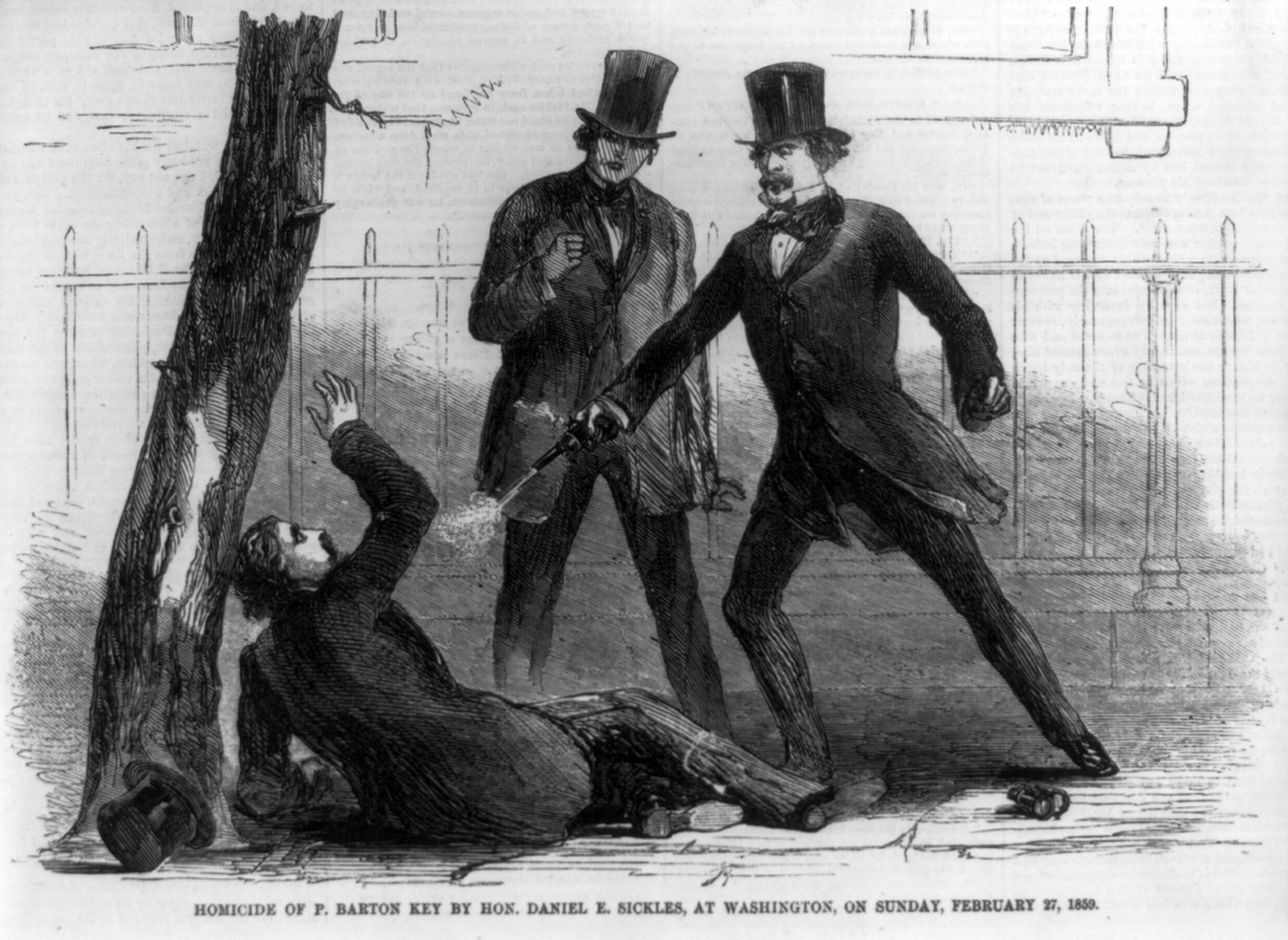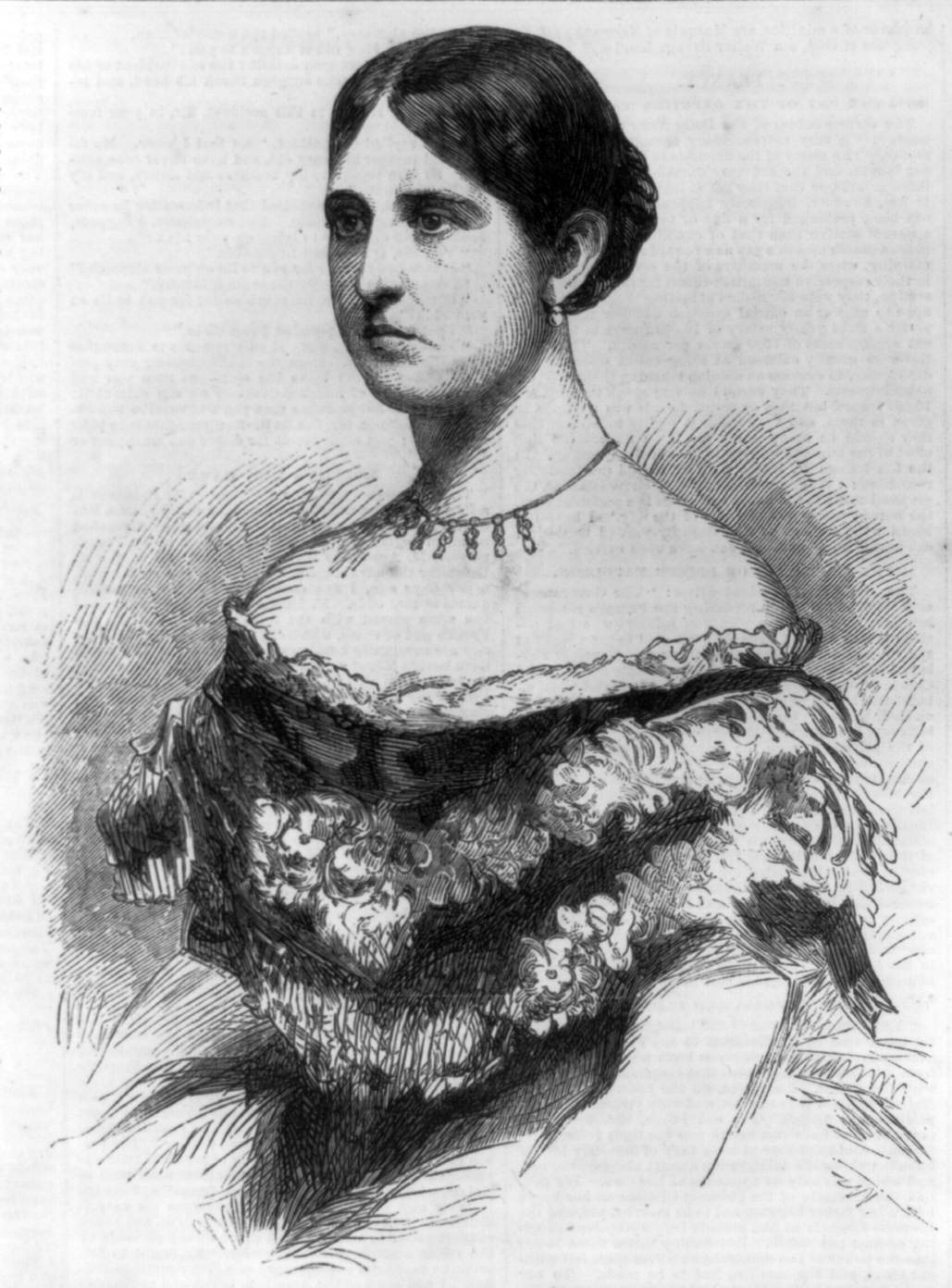Philip Barton Key (1818-1859) on:
[Wikipedia]
[Google]
[Amazon]
Philip Barton Key II (April 5, 1818 – February 27, 1859)Richardson, Hester Dorsey. ''Side-Lights on Maryland History: With Sketches of Early Maryland Families.'' Baltimore, Md.: Williams and Wilkins company, 1913. was an American lawyer who served as
 Born in Georgetown, D.C., Key was the son of Francis Scott KeyWalther, Eric H. ''The Shattering of the Union: America in the 1850s.'' New York: Rowman & Littlefield, 2004. and the great-nephew of
Born in Georgetown, D.C., Key was the son of Francis Scott KeyWalther, Eric H. ''The Shattering of the Union: America in the 1850s.'' New York: Rowman & Littlefield, 2004. and the great-nephew of  Key was appointed to his father's former position,
Key was appointed to his father's former position,  Sometime in the spring of 1858, Teresa Sickles began an affair with Key. Dan Sickles, though a serial adulterer himself, had accused his much-younger wife of adultery several times during their five-year marriage, she had repeatedly denied it to his satisfaction. But then Sickles received a
Sometime in the spring of 1858, Teresa Sickles began an affair with Key. Dan Sickles, though a serial adulterer himself, had accused his much-younger wife of adultery several times during their five-year marriage, she had repeatedly denied it to his satisfaction. But then Sickles received a
''Murder of the U.S. Attorney''
/ref>
escorts was Philip Barton Key *
{{DEFAULTSORT:Key, Philip Barton 1818 births 1859 deaths 1859 murders in the United States People from Georgetown (Washington, D.C.) American murder victims Daniel Sickles Burials at Westminster Hall and Burying Ground American prosecutors People murdered in Washington, D.C. Deaths by firearm in Washington, D.C. United States Attorneys for the District of Columbia Key family of Maryland Lloyd family of Maryland Burials at Oak Hill Cemetery (Washington, D.C.)
U.S. Attorney
United States attorneys are officials of the U.S. Department of Justice who serve as the chief federal law enforcement officers in each of the 94 U.S. federal judicial districts. Each U.S. attorney serves as the United States' chief federal ...
for the District of Columbia
)
, image_skyline =
, image_caption = Clockwise from top left: the Washington Monument and Lincoln Memorial on the National Mall, United States Capitol, Logan Circle, Jefferson Memorial, White House, Adams Morgan, ...
. He is most famous for his public affair with Teresa Bagioli Sickles
Teresa Bagioli Sickles (1836 – February 5, 1867) was the wife of Democratic New York State Assemblyman, U.S. Representative, and later U.S. Army Major General Daniel E. Sickles. She gained notoriety in 1859, when her husband murdered her love ...
, and his eventual murder at the hands of her husband, Congressman Daniel Sickles of New York. Sickles defended himself by adopting a defense of temporary insanity
The insanity defense, also known as the mental disorder defense, is an affirmative defense by excuse in a criminal case, arguing that the defendant is not responsible for their actions due to an episodic psychiatric disease at the time of the ...
, the first time the defense had been used in the United States. Gallagher, Gary W. ''Three Days at Gettysburg: Essays on Confederate and Union Leadership.'' Kent, Ohio: Kent State University Press, 1999.
Biography
Philip Barton Key
Philip Barton Key (April 12, 1757 – July 28, 1815), was an American Loyalist during the American Revolutionary War and later was a United States Circuit Judge and Chief United States Circuit Judge of the United States circuit court for the F ...
. He was also a nephew of Chief Justice Roger B. Taney
Roger Brooke Taney (; March 17, 1777 – October 12, 1864) was the fifth chief justice of the United States, holding that office from 1836 until his death in 1864. Although an opponent of slavery, believing it to be an evil practice, Taney belie ...
.Flower, Frank Abial. ''Edwin McMasters Stanton: The Autocrat of Rebellion, Emancipation, and Reconstruction.'' New York: W.W. Wilson, 1905. He married Ellen Swan, the daughter of a Baltimore
Baltimore ( , locally: or ) is the List of municipalities in Maryland, most populous city in the U.S. state of Maryland, fourth most populous city in the Mid-Atlantic (United States), Mid-Atlantic, and List of United States cities by popula ...
attorney, on November 18, 1845. Allegedly the most handsome man in Washington and by 1859 a widower with four children, Key was known to be flirtatious with many women.
 Key was appointed to his father's former position,
Key was appointed to his father's former position, United States Attorney for the District of Columbia
The United States Attorney for the District of Columbia (USADC) is the United States Attorney responsible for representing the federal government in the United States District Court for the District of Columbia. The U.S. Attorney's Office for the ...
, by President Pierce
Pierce may refer to:
Places Canada
* Pierce Range, a mountain range on Vancouver Island, British Columbia
United States
* Pierce, Colorado
* Pierce, Idaho
* Pierce, Illinois
* Pierce, Kentucky
* Pierce, Nebraska
* Pierce, Texas
* Pierce, We ...
in September 1853, during a recess of the Senate; the Senate later confirmed his nomination in March 1854. Four years later, he was nominated, and confirmed again, for another four-year term; thus, he would serve until his death.
 Sometime in the spring of 1858, Teresa Sickles began an affair with Key. Dan Sickles, though a serial adulterer himself, had accused his much-younger wife of adultery several times during their five-year marriage, she had repeatedly denied it to his satisfaction. But then Sickles received a
Sometime in the spring of 1858, Teresa Sickles began an affair with Key. Dan Sickles, though a serial adulterer himself, had accused his much-younger wife of adultery several times during their five-year marriage, she had repeatedly denied it to his satisfaction. But then Sickles received a poison pen letter
A poison pen letter is a letter or note containing unpleasant, abusive, or malicious statements or accusations about the recipient or a third party. It is usually sent anonymously. In the term "poison pen" (or poisoned pen), the word poison is u ...
informing him of his wife's affair with Key. He confronted his wife, who confessed to the affair. Sickles then made his wife write out her confession on paper.Hartog, Hendrik. ''Man and Wife in America: A History.'' Reprint ed. Cambridge, Mass.: Harvard University Press, 2002.
Sickles saw Key sitting on a bench outside the Sickles home on February 27, 1859, signalling to Teresa, and confronted him. Sickles rushed outside into Lafayette Square, cried "Key, you scoundrel, you have dishonored my home; you must die", and with a pistol repeatedly shot the unarmed Key.
Death
Key was taken into the nearby Benjamin Ogle Tayloe House, where he died sometime later.Smith, Hal H. "Historic Washington Homes." ''Records of the Columbia Historical Society, Washington.'' 1908. Sickles was acquitted based ontemporary insanity
The insanity defense, also known as the mental disorder defense, is an affirmative defense by excuse in a criminal case, arguing that the defendant is not responsible for their actions due to an episodic psychiatric disease at the time of the ...
, a crime of passion
A crime of passion (French: ''crime passionnel''), in popular usage, refers to a violent crime, especially homicide, in which the perpetrator commits the act against someone because of sudden strong impulse such as anger rather than as a premed ...
, in one of the most controversial trials of the 19th century. It was the first successful use of the defense in the United States."Crime History", ''The Washington Examiner'', Feb. 27, 2012, p. 8. One of Sickles' attorneys, Edwin Stanton
Edwin McMasters Stanton (December 19, 1814December 24, 1869) was an American lawyer and politician who served as U.S. Secretary of War under the Lincoln Administration during most of the American Civil War. Stanton's management helped organize ...
, later became the Secretary of War
The secretary of war was a member of the U.S. president's Cabinet, beginning with George Washington's administration. A similar position, called either "Secretary at War" or "Secretary of War", had been appointed to serve the Congress of the ...
. Newspapers declared Sickles a hero for "saving" women from Key. Years later, while attending the theater in New York City, Sickles became aware of the presence of Key's son, James Key, in the audience; both men watched each other throughout the performance. Nothing happened.
Key is buried in Oak Hill Cemetery, with a dedicatory in his son-in-law's family plot in Westminster Hall and Burying Ground
Westminster Hall and Burying Ground is a graveyard and former church located at 519 West Fayette Street (at North Greene Street) in Baltimore, Maryland, United States. It occupies the southeast corner of West Fayette and North Greene Street on ...
in Baltimore
Baltimore ( , locally: or ) is the List of municipalities in Maryland, most populous city in the U.S. state of Maryland, fourth most populous city in the Mid-Atlantic (United States), Mid-Atlantic, and List of United States cities by popula ...
./ref>
Notes
References
External links
* One oescorts was Philip Barton Key *
{{DEFAULTSORT:Key, Philip Barton 1818 births 1859 deaths 1859 murders in the United States People from Georgetown (Washington, D.C.) American murder victims Daniel Sickles Burials at Westminster Hall and Burying Ground American prosecutors People murdered in Washington, D.C. Deaths by firearm in Washington, D.C. United States Attorneys for the District of Columbia Key family of Maryland Lloyd family of Maryland Burials at Oak Hill Cemetery (Washington, D.C.)